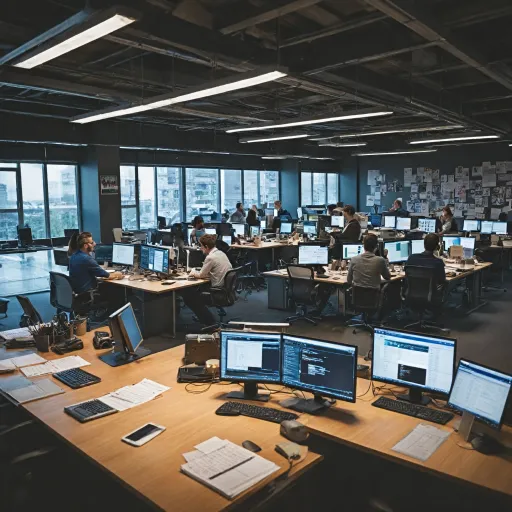
Defining DEI and MEI in the HR Context
Decoding Diversity, Equity, and Merit in Human Resources
When it comes to understanding the distinction between DEI and MEI in the realm of Human Resources, it's crucial to grasp their foundational definitions. DEI, which stands for diversity, equity, and inclusion, aims to create a workplace environment that encompasses varied perspectives and ensures equal opportunities for all, regardless of one's background or identity. The focus here is to dismantle systemic barriers that deter underrepresented groups from achieving career advancement and belonging. In contrast, MEI focuses on merit, excellence, and inclusion, advocating for a workplace culture where individual performance and talent drive hiring and promotion decisions. This approach emphasizes rewarding individuals based solely on their skills and contributions, thereby maintaining high standards of performance and problem-solving efficiency. The goal is to create a merit-based system that promotes excellence and encourages organizations to leverage the best talent available. Many companies today are integrating these concepts into their operations, yet the challenge remains in achieving a seamless balance. It necessitates a strategic approach that values diversity equity while simultaneously reinforcing merit excellence within the organization. To effectively navigate DEI and MEI initiatives, HR leaders are increasingly turning to artificial intelligence as a catalyst for promoting inclusion and merit. To further grasp these dynamics, understanding the essentials of adverse action notice requirements in AI for HR can provide valuable insights into how technology influences these two pivotal HR concerns. More on that will be explored in upcoming sections.The Role of AI in Promoting DEI
The Influence of AI on Diversity, Equity, and Inclusion
Artificial Intelligence (AI) is increasingly becoming a pivotal tool for companies aiming to enhance their Diversity, Equity, and Inclusion (DEI) initiatives. By leveraging AI, organizations can address systemic barriers that have historically hindered the inclusion of underrepresented groups in the workplace. This technology offers a data-driven approach to identifying and mitigating bias in hiring and promotion processes, thereby fostering a more inclusive workplace culture.
AI's potential to promote DEI lies in its ability to analyze vast amounts of data to uncover patterns of bias that might not be immediately apparent to human evaluators. For instance, AI can be used to scrutinize job descriptions and remove language that may inadvertently deter diverse candidates. Additionally, AI-driven tools can help ensure that performance-based evaluations are fair and equitable, focusing on merit and excellence rather than subjective criteria.
AI-Driven DEI Programs and Initiatives
Many organizations are now implementing AI-based DEI programs to enhance their hiring and talent management strategies. These initiatives often involve using AI to create more inclusive hiring practices, such as blind recruitment processes that focus solely on candidates' skills and experiences. By doing so, companies can build a more diverse talent pool, which is crucial for fostering innovation and problem-solving within high-performing teams.
Moreover, AI can support ongoing DEI efforts by continuously monitoring workplace culture and identifying areas for improvement. This proactive approach enables organizations to maintain a focus on equity and inclusion, ensuring that all employees feel a sense of belonging and are empowered to contribute to their fullest potential.
For a deeper understanding of how AI can influence DEI in HR, you can explore the impact of AI on workplace policies and practices.
AI's Impact on MEI in HR
The Influence of Artificial Intelligence on Performance and Merit
Artificial Intelligence (AI) is increasingly playing a pivotal role in shaping how companies approach Merit Excellence Initiatives (MEI) in Human Resources. By leveraging data-driven insights, organizations can harness AI to create a merit-based hiring and promotion system that elevates workplace culture and promotes high performance.
AI systems can analyze vast amounts of employee data to recognize patterns and correlations related to performance, talent, and merit. This ability allows companies to ensure that their MEI DEI programs are aligned with their objectives of promoting excellence and recognizing true talent across their organizations. By utilizing AI, HR departments can base their hiring and promotion decisions on factual and comprehensive data, rather than subjective evaluations or biased narratives.
Moreover, AI's role in supporting an equitable workplace cannot be overstated. AI tools can identify and mitigate systemic barriers that underrepresented groups might face. For instance, AI-driven performance metrics can remove personal bias and shift the focus to measurable excellence, creating a fairer and more inclusive environment. As a result, efforts toward equity and inclusion belonging are complemented by a merit-based performance approach, fostering an environment where all employees can thrive based on their actual contributions.
However, it’s important to note that AI's impact on MEI isn’t without challenges. The main concern is ensuring that AI systems do not inadvertently perpetuate existing biases present in historical data. To this end, companies must apply robust problem-solving strategies and remain vigilant in scrutinizing AI outputs. For a deeper dive into how these technologies navigate contingent job offers in recruitment processes, you can explore this comprehensive guide.
In conclusion, while AI introduces the potential for transformative change in organizations' approaches to MEI, achieving this requires a deliberate and balanced approach. It should be integrated with a focus on equity and unbiased performance metrics to truly harness its potential for promoting diversity, equity, and inclusion alongside merit-based recognition.
Balancing DEI and MEI with AI
Finding a Harmonious Approach
In the intersection of diversity equity and excellence in HR, finding a balance can be quite challenging. AI has made it possible for organizations to work towards achieving a harmony between promoting diversity and supporting merit excellence. However, it's crucial for companies to ensure that neither diversity nor merit gets overshadowed by the other. When focusing on diversity, equity inclusion in the workplace, it's essential to use AI tools to support DEI initiatives effectively. AI can help identify systemic barriers and offer solutions to increase the representation of underrepresented groups. However, a merit based approach should also come into play to recognize talent based hiring and promotion. This requires AI to objectively assess skills, performance, and potential to ensure that high performing individuals receive recognition, regardless of background. The integration of AI can foster an inclusive culture by measuring performance based on objective metrics. This practice allows companies to focus on building a culture where inclusion and belonging are at the forefront while maintaining merit excellence. By utilizing AI, organizations can promote equity inclusion efforts and ensure that the workplace culture evolves to support both DEI and MEI programs. AI aided hiring processes can be tailored to reduce bias, emphasizing both diversity and merit-based criteria. It's essential for companies to adopt this dual focus to support workplace culture transformation while maintaining business objectives. However, the challenge remains in implementing AI systems intelligently to ensure they drive not just the best performance outcomes but also address DEI efforts effectively, enhancing workforce diversity without compromising on excellence. Organizations must consistently review and adjust their AI strategies. This requires ongoing collaboration and feedback loops to refine their approaches, ensuring a focus on problem solving that incorporates input from various people across the company. By understanding and addressing the nuances between DEI and MEI, companies can set the stage for both innovative and inclusive talent management strategies.Case Studies: Successes and Failures
Real-World Applications and Lessons Learned
In the journey of integrating artificial intelligence into human resources, companies have experienced both triumphs and setbacks. These experiences offer valuable insights into the practical application of AI in promoting diversity, equity, and inclusion (DEI) as well as merit, excellence, and inclusion (MEI) within the workplace.
Success Stories: Leveraging AI for DEI
Several organizations have successfully harnessed AI to enhance their DEI initiatives. By using AI-driven tools, these companies have managed to identify and mitigate systemic barriers that often hinder the hiring and promotion of underrepresented groups. For instance, AI algorithms can analyze job descriptions to eliminate biased language, ensuring a more inclusive approach to talent acquisition. This has led to a more diverse workforce, fostering a culture of inclusion and belonging.
Challenges in MEI: Striking the Right Balance
While AI has proven beneficial in promoting DEI, its impact on MEI has been mixed. Some organizations have struggled to balance merit-based hiring with the need for diversity. AI systems, if not carefully designed, can inadvertently reinforce existing biases, undermining efforts to achieve merit excellence. Companies must focus on developing AI solutions that prioritize both performance-based metrics and diversity equity to create a high-performing workplace culture.
Learning from Failures: Addressing Bias and Improving AI Models
Failures in AI implementation often stem from a lack of understanding of the complexities involved in DEI and MEI. In some cases, AI models have been criticized for perpetuating bias, leading to unfair hiring and promotion practices. These instances highlight the importance of continuous monitoring and refinement of AI systems. Organizations must adopt a proactive approach to identify and rectify biases, ensuring that AI tools contribute positively to their DEI programs.
Key Takeaways for Organizations
- Invest in AI tools that support both DEI and MEI objectives.
- Regularly audit AI systems to identify and eliminate biases.
- Foster a workplace culture that values diversity, equity, and inclusion alongside merit and excellence.
- Engage in ongoing training and development to enhance AI literacy among HR professionals.
By learning from both successes and failures, companies can better navigate the complexities of AI in human resources, ultimately creating a more equitable and high-performing workplace.
Future Trends and Considerations
Trends Shaping the Future of AI in Diverse and Merit-Based Environments
The integration of artificial intelligence in human resources is evolving, with upcoming trends signaling a shift in how diversity, equity, inclusion, and merit-based systems are managed. As companies strive for a balance between DEI and MEI, it is crucial to understand the implications of these technologies on workplace culture and talent acquisition.Organizations are focusing more on their DEI programs, ensuring underrepresented groups feel a sense of inclusion and belonging. The aim is to break systemic barriers and promote a performance-based culture that is diverse and inclusive.
- Data-Driven Decisions: AI-driven analytics are becoming indispensable in measuring DEI efforts. These tools offer insights into performance and hiring trends that help organizations tailor their approaches based on real-time data.
- Bias Detection and Mitigation: AI systems are being designed to detect and mitigate bias in hiring promotion and talent evaluation. This helps foster a workplace that emphasizes equity inclusion and merit excellence.
- Cultural Adaptation: Companies are finding ways to use AI to adapt workplace culture to be more inclusive, ensuring that diversity equity thrives. This includes leveraging AI for enhanced problem-solving and talent management.
- Continuous Learning and Adaptation: The need for solutions that adapt over time is more pressing than ever. Organizations are investing in AI that not only highlights cultural gaps but also facilitates continuous learning to foster an inclusive environment.
The role of AI in shaping the future of DEI and MEI is not just about implementing technology but embracing an approach focused on inclusion and excellence intelligence. By keeping a pulse on AI developments, companies can maintain a high performing culture that is both diverse and equitable while fostering merit-based hiring practices.













